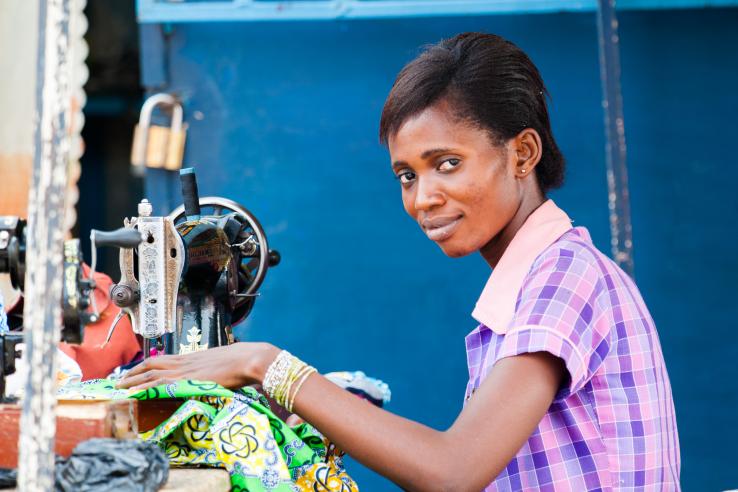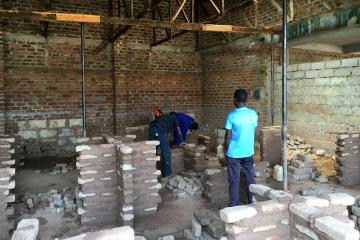
Reflecting on J-PAL’s Jobs and Opportunity Initiative’s first year

J-PAL’s Jobs and Opportunity Initiative (JOI) has hosted three funding rounds and funded more than twenty projects in its first year.
Quality employment is one of the many ways people can graduate from poverty. Yet, in 2019, more than 188 million people were unemployed globally. Many more remained trapped in low-quality jobs with low pay, unsafe working conditions, and no benefits. Policymakers have designed a wide array of programs to address these challenges, but many open questions remain about how best to improve employment.
In 2020, the problem of unemployment has only become more salient as the COVID-19 pandemic disrupted and altered labor markets and livelihoods across the globe. The International Labour Organization estimates that global working hours decreased by up to 14 percent in the second quarter of 2020, equal to roughly 400 million full-time jobs.
In early March 2020, J-PAL launched JOI, with support from Google.org, to answer some of the most pressing questions related to employment facing policymakers, employers, and job seekers.
Shortly after JOI’s launch, the World Health Organization characterized COVID-19 as a pandemic, and governments around the world began enacting lockdowns to restrict movement and curb the spread of COVID-19. Production shutdowns, economic slowdowns, and a global recession followed, breaking valuable work relationships and inducing job loss.
Leveraging J-PAL’s network to fund policy-relevant research and rapidly respond to the COVID-19 pandemic
JOI was set up to host two regular competitive funding rounds for labor markets research in 2020. But given the existing infrastructure of the initiative, the commitment of our academic co-chairs Marianne Bertrand (University of Chicago) and Bruno Crépon (ENSAE and École Polytechnique), and the support of Google.org, we were able to quickly pivot and open a third COVID-19 response funding round that ran from mid-March through September.
During this time, implementing partners and researchers in our network came together to submit 24 creative proposals responding to COVID-19-induced labor market disruptions around the world, seeking answers to pressing policy-relevant questions. We were able to provide teams with rapid decisions, funding a total of nine projects over a period of about six months.
A snapshot of JOI-funded projects
Over the course of 2020, JOI has funded more than twenty projects that seek to answer important questions in labor markets policy.
For example, production shutdowns due to the COVID-19 pandemic have severed valuable ties between employers and workers across labor markets around the world. Protecting work relationships, especially for positions where workers tend to learn on the job and develop job- or firm-specific skills, may mitigate COVID-19’s longer-term economic impacts as the economy recovers and firms look to re-hire workers. In Myanmar, researchers are conducting a randomized evaluation to test the impact of providing wage vouchers—which pay for part of a worker’s salary and may encourage firms to hire more workers or keep on existing workers—on the employment, earnings, and productivity of laid-off garment factory workers.
In low- and middle-income countries, labor markets are often inefficient, with relatively long search durations for job seekers, low-quality matches between firms’ needs and job seekers’ skills, and high turnover. Researchers are partnering with Harambee Youth Employment Accelerator to evaluate how matching on different types of information about job seekers changes the quality of worker-firm matches in South Africa.
Forming business networks can be important for business growth through information sharing and building business partnerships, yet in many contexts, women tend to have smaller professional networks than men. Researchers are exploring whether online professional networking groups, combined with access to legal information and advisory services, can foster interfirm collaboration among female entrepreneurs and improve their business performance in Ghana.
Looking forward
In JOI’s first year, we received 63 proposals for projects based in thirty countries. These numbers signal the extent of excitement from implementers and researchers to rigorously evaluate innovations in the jobs and opportunity space. With our current resources, JOI will host four more regular funding rounds over the spring and fall of 2021 and 2022.
In the future, J-PAL aims to expand JOI regionally and thematically, securing more resources to fund policy-relevant research and to expand the questions we address related to job creation and firm growth. If you’re interested in exploring a partnership, please reach out to [email protected]. For future updates on JOI and our broader work at J-PAL, sign up for the J-PAL newsletter and note your interest in labor markets.

